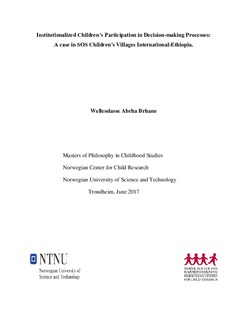| dc.description.abstract | The goal of this study was to get knowledge about institutionalized children’s experience in decision-making processes that affect their lives. Thus, the study has sought to answer questions relating to; the way both children and adults perceived children’s participation in decision-making; whether children are involved in such processes or not; and the progresses, challenges and ways of improvement in relation to children’s participation in decision-making processes.
The study was conducted in a branch village of SOS Children’s Villages International in Ethiopia. The research design adopted was qualitative research method. In selecting the methodology and theoretical framework which adopted in this study, research questions and participants of the study was considered. Institutionalized children, SOS mothers, social workers and management representative were the research participants. Tools of data collection such as naming method, life mapping method, semi-structure interview and informal dialogue, focus group discussion, unstructured observation, and sentence completion as a protection tool have been implemented. The collected data have been analyzed and discussed in line with the theories of childhood studies, child right discourses and related literatures.
Accordingly, the results reveal that both child and adult participants have heterogeneous perspectives towards children’s participation in decision-making processes that affect their lives.
The adult participants’ perspectival variation leveled from totally opposing child participation to allowing children to be consulted and have a say in issues that concern their lives. Likewise, even though the child participants have varies standpoints, they all agreed on three points: 1) The need of final decisions to be decided by their elders. 2) A wish to participate in decision-making processes. 3) The importance of their participation, even if they describe it in different ways. Although child participants are interested to participate, they are not participating in most of decision-making processes, especially in issues they consider as important for their lives. However the study reveals that there are some progress that encourages children participation, though it is still slow, and challenged for different reasons. The top-down rigid institutional policy, rules and regulation have identified as the center of all challenges. Thus the study have concluded that to improve the children’s participation right, it is necessary to revise policies in the way that could involve all stakeholders including children in designing, developing and adopting the rules and regulations of their institution. | nb_NO |
